英国海盗电台 (2) – The History of UK Pirate Radio (Pt 2)
By Zak.
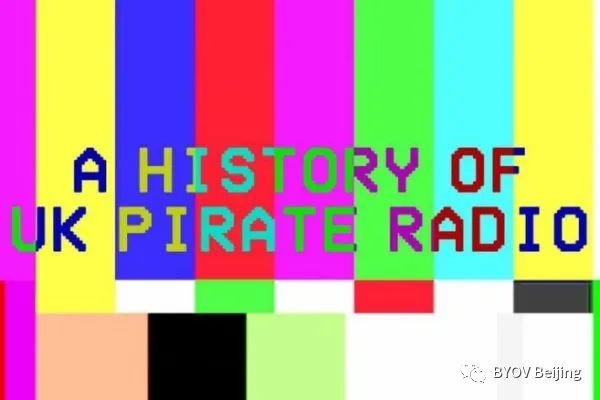
For the complete article with music and videos, check it on wechat https://mp.weixin.qq.com/s/_rM_wZSmOl2q_Iq5wQWumQ
海盗电台为英国音乐史带来了一些非同寻常的改革和创新,它彻底打破了向听众输出音乐的固有范式,尤其是在广播电台的运营模式和播出内容上有着不可颠覆的深远影响。追其根源,海盗电台诞生于20世纪60年代,成立初期它主要介绍流行音乐和摇滚音乐给满怀期待的听众们,在近代时期更是把说唱,R&B和其他地下音乐普及到人们的生活中。
Pirate radio has been the site of some of the most important musical innovations in Britain and revolutionized the way that music was delivered to the people, influencing both the format and content of what was sent over the airwaves. It introduced pop and rock to a starving audience in the 60’s, and in the more modern era launched the career of countless hip-hop, R&B, and other underground genres.
正如熟悉历史的狂热粉丝所熟知,英国海盗广播电台的历史始于卡罗琳广播电台,他们受到“摇滚船”卡罗琳广播电台的启发,60年代的无数新组织开始创建自己的海上海盗电台,引发了英国当年的一次音乐革命。引用美国黑人民权运动领导人马尔科姆X的话“这场革命不会在电视上播出”,然而英国的这场音乐革命是在广播电台上播出的。
For many avid fans, the history of pirate radio stations started with Radio Caroline in the UK. However, Caroline was far from the only offshore station bringing music to listeners who didn’t appreciate the traditional approach of the BBC. Inspired by “the boat that rocked the world,” Radio Caroline, countless new organisations began to make names from themselves in the mid 60’s and the revolution, though not televised, certainly took place over the airwaves.
在英国,海盗电台的历史影响延续至今,甚至是垄断英国电台广播的英国广播公司(BBC)也借鉴了海盗电台的经验,并且对节目内容和经营模式做出了适当的调整和改变,为了恢复垄断地位,BBC广播电台1(BBC 1)于1967年启动,这档电台广播节目便模拟了海盗广播的形式。为了让曾经常常收听海盗电台的粉丝能再次听到熟悉的声音,该电台还将曾就职于盗播电台的著名DJ,例如约翰·皮尔(John Peel),托尼·布莱克本(Tony Blackburn)和肯尼·埃弗里特(Kenny Everett)等纷纷揽入BBC麾下。
The history of pirate radio was so significant in the UK, that the company which monopolized UK broadcasting, the BBC ,eventually started to replicate the pirate style. BBC Radio 1 launched in 1967 in response to the growing demand for pirate radio stations. Programs were designed to emulate the experiences of pirate radio, even going as far as luring the most famous of the pirate DJs to seek a future in legal broadcasting. Ex pirate radio favourites like John Peel, Tony Blackburn, and Kenny Everett were brought over to the BBC to recreate the pirate feel on legal radio
What happened to the pirates of the UK?
尽管人们普遍认为,《海洋犯罪广播法》造成英国海盗广播电台的死亡,不过直到90年代为止,卡罗琳广播电台仍然处于运行中,他们通过海洋上的各种船只进行广播,直到1990年才停止航海,之后便开始登陆运行。
由于后来新一代电台更受听众们的喜爱,再加上近几年卡罗琳播放时间很不稳定,听众们日渐稀少,但这叛逆电台又怎么会轻易说放弃,因此到今天为止他们依旧继续广播。
虽然卡罗琳一直竭尽全力地坚持着,但是由于不可抗力的打击,使得60年代和70年代末的海上海盗电台数量减少,甚至彻底消亡。与此同时,商业合法的电台重组之后又拿回了广播的控制权。不过值得庆幸的是,从80年代初起,新的一批海盗电台开始在陆地纷纷扎营,也因此守护住了海盗电台文化,直到今天。
Despite common perception, the Marine Offences Broadcasting Act didn’t spell the end of UK pirate radio history. Radio Caroline managed to evade all the odds and broadcast from various boats on the oceans all the way up to 1990 before moving to land operations where it still continues to broadcast, though infrequently and to a far smaller following, until this very day. However, in large part due to the government’s crackdown pirate radio dwindled through the end of the 60’s and 70’s with offshore rigs ceasing to operate and commercial radio restructuring and regaining its stranglehold on the airwaves. However since the start of the 80’s the pirates have made considerable bases inland
1980’s
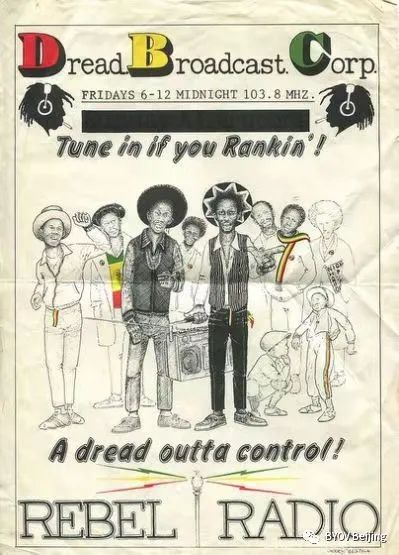
Originally named Rebel Radio but later Dread Broadcasting Corporation (DBC) to mock the BBC
脏辫儿电台(Dread Broadcasting)早期海报
在80年代,海盗电台曾经的那般史诗级规模卷土重来,但是与以往有所不同的是,新一代的电台更致力于发扬少数种族文化和音乐。脏辫儿电台(Dread Broadcasting)成立于1980年,是英国历史上第一家黑人拥有的音乐台,它主要播放雷鬼和索卡音乐,然而可惜的是,这档电台寿命仅仅维持了四年,最终于1984年停止广播,不过它短暂而光辉的存在启发了80年代诸多类似电台的出现,这些电台播放其他合法电台上很少听到的各种黑人音乐。
诸如Horizon,Jazz Funk Music,LWR之类的电台,其中还包括最著名的Kiss FM,这台电台专门播放灵魂,雷鬼,放克和其他英国广播电台很少播放的音乐类别。
However in the 1980s pirate radio saw a comeback of epic proportions, when a new generation decided they weren’t being represented on air. Dread Broadcasting, established in 1980, was the first black owned music station, primarily playing reggae and soca music. Though it only stayed on air for 4 years, its inception was followed by a wave of other stations that followed throughout the 80’s, playing a variety of black music seldom heard on other stations.
Stations such as Horizon, Jazz Funk Music, LWR and then, most famously, Gordon Mac’s iconic Kiss FM specialized in soul, reggae, funk and other music absent from UK radio.
随着DJ们和听众们对BBC以及其它合法电台内容的不满与日俱增,其中最让人不悦的是合法电台缺乏对英国少数种族音乐的关注和代表,这一现象最终导致了海盗电台的复兴。
英国社会的多元文化,尤其是在大城市中,反映了英国殖民时期的历史,英国的少数种族大部分都是来自于原来的殖民地,不过合法电台广播的内容和关注点主要迎合了中产阶级的白种人听众的需求。在英国首相撒切尔(Margaret Thatcher)执政的右派政府里几乎没有少数民族政治代表,更没有主流媒体的代表人,海盗电台终于给了少数民族,尤其是来自非洲和加勒比海的人提供了一个展示自己音乐和文化的平台。因此,这批新一代的海盗广播电台几乎专门演奏雷鬼,灵魂,放克和说唱等属于黑人音音乐。
在过去甚至到现在海盗电台给予了一些少数民族还有其它生活在社会边缘的群体一个社交平台。伦敦唯一有关海盗电台的杂志——今天的电台(Radio Today),曾列出全英国运行的海盗电台的名单,它明确而清晰的标出了代表伦敦希腊和土耳其民族的电台,甚至可以看到代表女权主义者的FMinist电台。
The scene developed from the growing dissatisfaction DJs and listeners had in the music that was being played by the BBC and licensed radio stations, including the lack of representation of the voice and music of Britain’s ethnic minorities. With the ethnic make-up of UK society, particularly in larger cities, mirroring the exploits and range of England’s colonial past, there was a stark contrast in the variety of radio material content and focus that largely catered for a white middle class audience. These new generation pirate radio stations almost exclusively played reggae, soul, funk and hip hop and acted as platforms of representation for Afro-Caribbean talent and influence in a conservative society ruled by Margaret Thatcher.
In the past and even today, through pirate radio, ethnic minorities and marginalized groups have found an easily accessible voice. In the only pirate radio magazine, Radio Today’s listings, there are stations for London’s Greek and Turkish communities. There’s even a station for Girls FM, the ‘pirate FMinists on air’.
由于过去的主流文化和媒体的内容单一针对白种人,因此渐渐疏远了英国少数民族,对于因为种族和经济阶级区别被逼到社会边缘中的他们来说,海盗电台给了他们一种宣泄情感的渠道。尽管广播的地点仍然鲜为人知,但迪厅和唱片店常常成为了电台追随者的聚集地,这些地方提供了安全,熟悉,适合社交互动和创意交流的场所。
This underground music rebellion represented a form of escape from the racial division and economic marginalization that mainstream culture and media alienated British ethnic minorities from. Though the locations of the broadcasts remained largely unknown, nightclubs and record shops became the gathering points for followers, acting as places for safe and welcome social interaction and creative exchange.
直到1989年,在英国大约已经有600个被称为“海盗”的广播电台,虽然早已不必伪装成60年代时采用的海盗船只的样子,但也为了不引起当局关注这些海盗电台被建立在伦敦和英国其他城市的隐蔽场所。大部分海盗电台的运行非常DIY。因为这些电台没有收入给不了工资,大多DJ们都是出自于热爱音乐而参与的,大多数小型电台都是由一帮朋友轮流播放歌曲组合的。然而有趣的是,传统广播电台和海盗广播电台似乎在曾经和睦的并肩存在过,即便他们针对的听众大为不同。
By 1989, there were about 600 radio stations classified as “pirates” in the UK – although they didn’t have the traditional ship rig of the 60’s, these stations broadcast across London and the rest of the UK from covert locations, always looking to stay a step ahead of the authorities. For a while, conventional and pirate radio stations seemed to exist side-by-side catering to a different set of crowds. Pirate stations were run in a very DIY manner, DJ’s more than always played for love of the music as there was no income for the stations, for smaller stations groups of friends rotated to play different set times.

尽管1984年执行的《电信法》给当局授权强制关闭非法电台场所,并没收其设备,但许多电台还是继续运营,甚至关闭之后以假名在其它地方重整旗鼓。这一现象就像几十年前第一代海上海盗电台一样,不服从法律约束,虽然路程曲折但一直没停泊。
这些电台从全国各个大城市贫穷地区的高层塔楼里偷偷进行广播,和其它区域比这些平穷区的少数民族居民会偏多一些。海盗电台与他们的老敌人贸易和工业部又开始玩起一场猫鼠游戏,随着海盗电台越来越受欢迎,为了不让人跟踪广播信号他们投资了新技术并采用了新的隐秘运营战术,使DTI很难抓到他们。
Despite the enforcement of the Telecommunications Act of 1984 that authorized forced entry and the confiscation of equipment, many of the stations just started elsewhere after being shut down, under another guised address. Undeterred by the law and just like the first generation of offshore radio stations decades before, they sailed on despite the choppy waters that surrounded them.
Broadcasting from high-rise tower blocks littered across the impoverished, generally ethnic minority populated, inner city areas of major cities across the country, these stations were involved in a cat-and-mouse game with their old adversary the Department Of Trade And Industry. As the pirates became more and more popular, they invested in new technology and adopted new tactics, making it more difficult for the DTI to track them down.
1990’s
在90年代初,因为英国贸易和工业部对海盗电台施加的压力和处罚更加严重,海盗电台的数额有所下降,但新电台的出现几乎与被关掉的频率差的不多。海盗广播电台也出现在世界各地的城市中,但英国合法电台缺乏多样性和满足不了听众们需求的状况,使其国家成为全世界海盗电台的温床,在90年代初,英国有500多个非法广播电台。BBC 1广播电台声称幻觉和狂欢音乐文化只是一时狂热,火不了多久,后来为了证明这说法是错误的有几个新电台诸如Sunrise,Centreforce和Fantasy也加入了海盗电台行列。
In the early 1990s, British pirate radio history saw a slight decline in response to some tougher penalties imposed by the Department of Trade and Industry, but stations continued to pop up almost as fast as they were brought down. Pirate radio stations appeared in cities across the world, but the severe lack of diversity on UK stations made it a real hotbed for pirates. At the beginning of the 1990’s, there were more than 500 illegal stations broadcasting in the UK, with dance and rave stations such as Sunrise, Centreforce and Fantasy joining more established pirates – especially after Radio 1 claimed that acid house and rave culture was going nowhere.
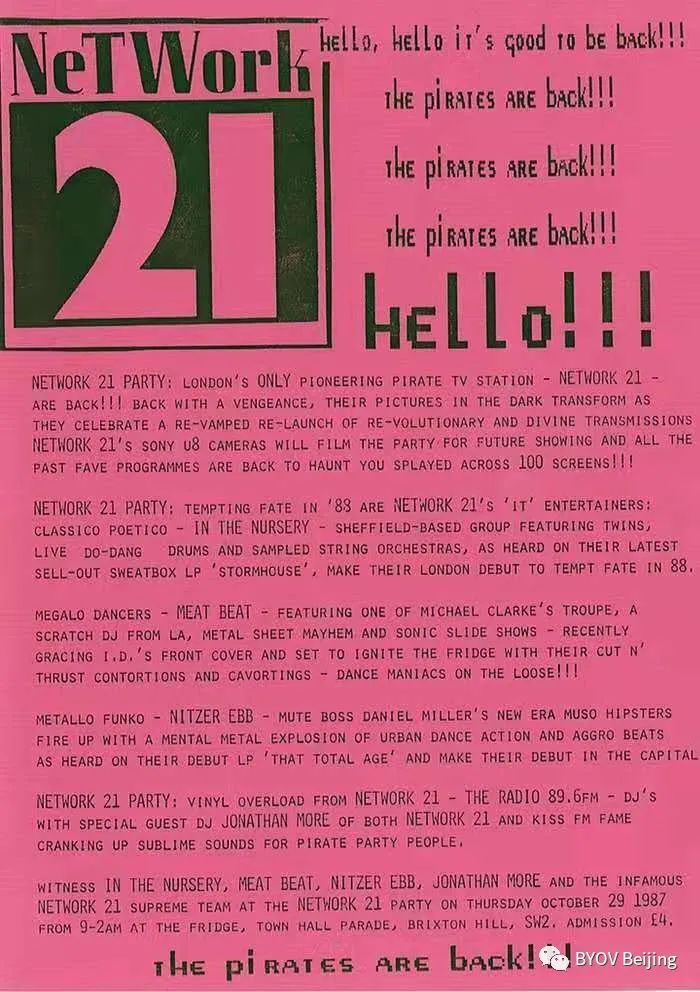
Network 21 pirate station promotes it’s night and advertises being back on air
“21频道”海盗电台举办的演出活动海报宣布该电台重新播放的消息
政府颁布了1990年的《广播法》后,增加了对海盗电台的镇压。该新法禁止海盗电台播出广告内容,这直接切断了这些电台的主要收入来源。另外政府还声明为拥有大量关注者的电台提供获得广播许可的机会。不过,只有立即停止广播的海盗电台才可以申请政府颁发的小量新发行的合法广播许可证。当时接受的电台之一有现已臭名昭著的Kiss FM,政府则对剩下没中选或没申请广播许可证的非法电台采取了进一步追捕和处罚的措施。
After the government introduced the Broadcasting Act of 1990, the crackdown on these stations began; it prohibited advertising and offered stations with sizeable followings the opportunity to become licensed. They offered stations a deal to go off air and become eligible for one of many new legal radio licenses being created. One station that took the deal was Kiss FM, the now infamously commercialized mainstream network, while the government got tough with those remaining.
The story of Kiss FM
Kiss FM没有像卡罗琳的摇滚船电台当年那样轰动世界,但对后代海盗电台的历史上来讲,它也同样占有领先地位。该组织于1985年10月成立,当然成立时间距最初的《海洋犯罪法》出台很久之后,但那个时候它属于第二代海盗电台早期出现的一台。该电台由94FM广播,由Gordon Mac McNamee创立,一举成名,招引了好多广播迷的注意力。
在全伦敦,Kiss FM获得了将近50万听众的热爱关注。为了竞选政府颁发的合法广播许可证,该电台自愿停播,而在第二年递交了第二次申请,最终成功中选,从此就变成全英国第一个播放黑人音乐的合法电台。
Kiss FM might not have had its own pirate radio ship, but it wasn’t any less of a buccaneering broadcaster in the eyes of its fans. The organisation launched in October of 1985, long after the original Marine Offences Act was first introduced. The station, broadcast on 94FM and was founded by Gordon Mac McNamee, was an instant success
Across Greater London, Kiss FM achieved a dedicated following with nearly half a million listeners, all while operating as a pirate radio station. The station voluntarily went off air in order to apply for one of a limited number of official licences offered by the government, their application finally succeeding on the second attempt, making it the first ever legal station in the UK dedicated to black music.
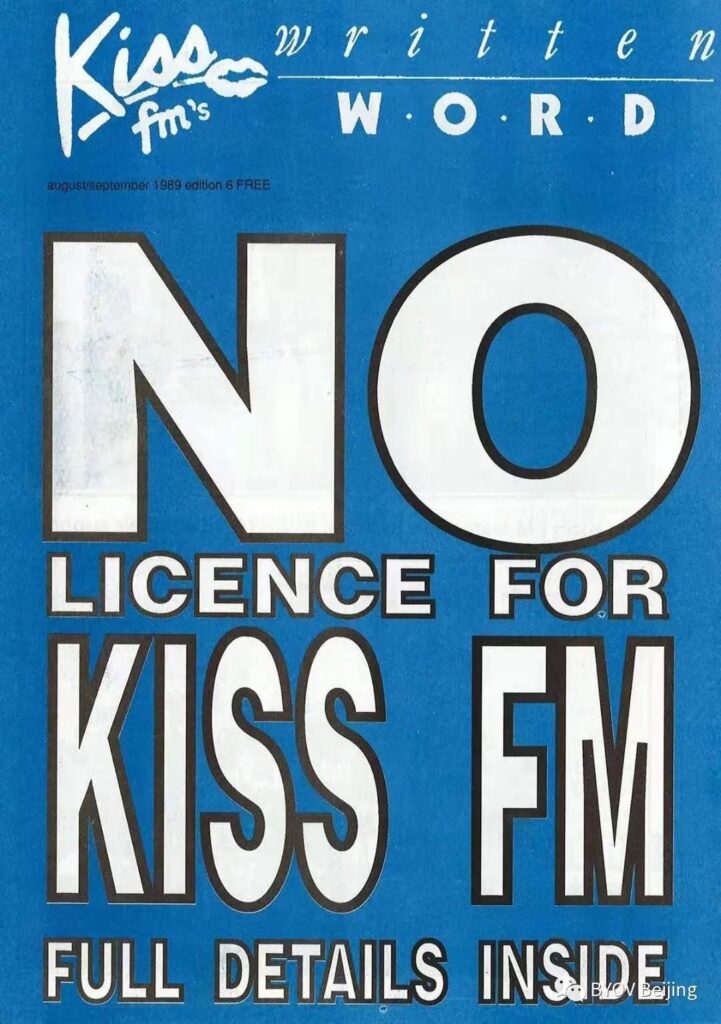
A poster helping strum up support for Kiss Fm’s licence application
为争取Kiss FM被中选获得广播许可证的海报
尽管Kiss FM成功地获得了许可证,但因后来转移成商业经营模式并开始改变播放音乐风格和节目内容,该电台受到很多人的批评,甚至还失去了许多最初的追随者。政府发行限量的许可证之后还有其它海盗电台也赢得合法广播许可,例如KFM广播,伦敦的Sunrise广播和布里斯托的FTP。结果,得到合法许可证之后,大多数电台也开始走更流行化的经营模式,播放内容也开始主要针对于大众,渐渐背离最初使它们成名的小众群体。
Though Kiss FM was successful in earning its license, the organisation received a lot of criticism and lost a lot of its original followers for offering a more commercialized range of music and diluting its content. Other pirate radio stations began to earn licenses at the same time, such as KFM Radio, Sunrise Radio in London, and FTP in Bristol. Most became significantly more mainstream as a result. Rather than serving the niche and under-represented genres that made them famous, these pirate radios turned legit by serving a broader range of audiences.
一直忠诚并支持海盗电台的许多铁杆粉丝对这些新的局面感到遗憾,他们拒绝接受这些电台的新方向,他们认为这些电台违背了他们的初衷,出卖了他们的最初支持者。这些粉丝没有再继续支持,反而开始收听其它比较接地气,坚持给社会基层民众提供想要内容的电台。
Many hardcore followers of the original pirate format of these radio stations lamented the loss and rejected the change in direction, feeling that in order to gain legal status these stations had sold out and lost their street edge. Instead of continuing to tune in, they simply switched to other pirate stations that stayed with their pirate roots and continued to play music for the underrepresented.
80年代海盗电台尝试着播出新风格的音乐,他们突破性的播放内容和方式获得了很多人的支持,随后,已经收到政府支持的合法电台也纷纷效仿。与上世纪60年代的局势一样,海盗为广播业先做的创新铺平了道路,直到更严格的政府立法将它们淘汰,但主流广播电台采纳了这些新趋势。看到听众们热衷于海盗电台提供新奇音乐风格像说唱和雷鬼等等的节目,商业电台也为这些类型的音乐也创建了专用节目。
The pirates of the 80’s experimentation with new underground sounds ad show formats took radio broadcasting into new territory, only for this territory to be reclaimed by commercial radio stations. Similar to what happened in the 60’s, pirates paved the way for new innovations until tighter government legislation squeezed them out and mainstream radio adopted these new trends. Having seen the demand for hip hop and reggae, previously unplayed genres, commercial stations created their own dedicated shows for these types of music.
一个典型的例子是BBC 1电台1993年将先前曾在LWR和早期Kiss FM等海盗电台中播放的蒂姆·韦斯特伍德(Tim Westwood)加入他们的名单,他把自己制作的Hip Hop和Reggae节目带到了BBC 1。Tim Westwood的Radio 1 Rap Show后来成为了迄今为止英国收听率和影响力最大的说唱专用广播节目。
The pirates of the 80’s experimentation with new underground sounds ad show formats took radio broadcasting into new territory, only for this territory to be reclaimed by commercial radio stations. Similar to what happened in the 60’s, pirates paved the way for new innovations until tighter government legislation squeezed them out and mainstream radio adopted these new trends. Having seen the demand for hip hop and reggae, previously unplayed genres, commercial stations created their own dedicated shows for these types of music.
一个典型的例子是BBC 1电台1993年将先前曾在LWR和早期Kiss FM等海盗电台中播放的蒂姆·韦斯特伍德(Tim Westwood)加入他们的名单,他把自己制作的Hip Hop和Reggae节目带到了BBC 1。Tim Westwood的Radio 1 Rap Show后来成为了迄今为止英国收听率和影响力最大的说唱专用广播节目。
KOOL FM & RUSH FM

KOOL FM the most influential jungle station of all time set up as a pirate in the early 90’s
1991年成立的Kool FM Jungle、Drum & Bass海盗电台的一个节目海报
As the government approved radio stations imitated and sought influence from the genres that pirate radio had shown them, pirate radio continued to adapt and play the newer urban sounds that mainstream radio didn’t, literally kick-starting the scene for a number of uniquely British urban music genres.
政府批准的合法广播电台越向海盗电台模仿节目内容和寻求启发,海盗电台就越转变,为了展示新都市现代音乐一直不断地做出内容上的调整,这一举动不仅为这些新类型的音乐给予了意义非凡的支持,也为他们被众人所熟知而推波助澜。
Stations like Kool FM and Rush FM entered the airwaves, and by the mid to late 1990s, genres like jungle, drum & bass, garage, and grime helped the history of pirate radio to continue. These new stations wanted to represent the streets and promote local scenes. They were chaotic. MCs and DJs hyped over tracks, shows were more like rowdy parties and audience participation was encouraged.
诸如Kool FM和Rush FM之类的电台进入了电台行列,到90年代中后期,诸如Jungle,D&B,Garage和Grime之类的音乐出现使得海盗广播一直受欢迎。这些新电台试图代表街头文化并宣传当地活动,但是由于执行者大多没有运行广播电台经验,导致电台组织和管理方面平常散乱。播音室里经常站满一大堆人,节目播放更像是喧闹随机性的家庭派对的状况屡见不鲜,加上鼓励观众参与的环节更像是伙伴们聚集玩耍,场面一度十分混乱。
Kool first broadcast on 28 November 1991, right at the start of the jungle scene, on the frequency of 94.5FM, from Hackney, East London. Kool has stated that it was “the very first pirate station ever to play hardcore jungle”. Simon Reynolds would call it “London’s ruling pirate station” in an account of the beginnings of jungle in his book Energy Flash, whilst in State of Bass, Martin James would consider it “The single most important pirate station in jungle”.
1991年11月28日,Kool FM,在Jungle 音乐诞生时期,开始以94.5FM的频率从东伦敦的哈克尼区播出。Kool自称是“有史以来第一个玩硬核Jungle的海盗电台”。西蒙·雷诺兹(Simon Reynolds)在其《能源闪电《关于Jungle起源的一本书,把Kool FM描述为“伦敦的领先海盗电台”,而在《巴斯州《中,马丁·詹姆斯(Martin James)则将其称为“对Jungle音乐最有影响力的海盗电台”。
Kool FM是全国领先的Jungle音乐电台,到1992年末,Kool开始宣传自己的活动,并于1993年8月成立了丛林狂热派对活动。
这档电台电台今天仍然存在,如今以互联网广播电台的形式广播,主要播放内容为,drum&bass以及Old Skool。人们普遍认为,库尔(Kool)在Jungle音乐界的发展中起了重要作用,到1994年,Jungle进入了主流,像雷维将军(General Levy)进入了排行榜前40位歌曲,电视广告还开始使用Jungle歌曲。
Kool FM was the leading pirate radio station within the jungle scene, by late 1992, Kool started to promote its own events, leading to the founding of the Jungle Fever night in August 1993.
The station is still intact today and now broadcasts as an internet radio station, playing jungle, drum and bass, and old skool. Kool is generally regarded as being instrumental in the development of the jungle music scene, by 1994 Jungle had entered the mainstream with tracks like General Levy entering the Top 40 charts and jungle songs being used on television adverts.
1996年4月,库尔(Kool)在英国广播公司(BBC)的第一眼(One Sight)纪录片中介绍了伦敦的海盗广播,其中还出现了库尔Kool Skool俱乐部之夜。同年,它通过在伯明翰开设姐妹电台Kool FM Midlands扩展业务,该电台一直持续到2002年。 2007年5月,Kool FM在BBC伦敦新闻报道中报道了海盗广播电台对应急无线电波的干扰。
In April 1996, Kool was featured in a BBC First Sight documentary about pirate radio in London, in which its Kool Skool club night also appeared. In the same year, it branched out by launching a sister station, Kool FM Midlands, based in Birmingham, which continued until 2002.
In May 2007, Kool FM featured in a BBC London News report about pirate radio station interference to the emergency services and their use of the airwaves.
Mid to Late ’90s and 2000’s
RINSE FM
由DJ Geeneus和DJ Slimzee创立的Rinse FM于1994年9月首次广播,其天线固定在扫帚手柄上。在2010年获得法律地位之前,它一直是英国车库(garage),污垢(grime)和dub-step等音乐类型播放的重要平台,开启了众多知名艺术家和DJ的职业生涯。在它成立初期的三年时间里,Rinse工作室就被安置在DJ Slimzee的家里。早期,它最开始主要播放Jungle,尤其着重于MC(歌手)的角色,这使Rinse在竞争中脱颖而出。在获得许可之前,该电台从秘密的临时位置(例如,属于朋友和DJ的厨房和卧室)广播,并不断在这些位置之间移动,以免被当局关闭。在Rinse属于海盗电台的16年中,他一直搬来搬去,直到,获得广播许可之后才安心工作。 2005年4月,追捕海盗电台的Ofcom结构断开了Rinse FM广播发射机的连接,并对Dean Fullman(艺名DJ Slimzee)实行ASBO限制令,禁止他上Tower Hamlets区所有高楼的屋顶,这是当地政府第一次实行类似的个人限制令。经过三年的申请和征求,Rinse FM终于在2010年获得了广播许可证。在此之前,这些电台被公认为伦敦最大的海盗广播电台和世界领先的污垢(grime)电台。
Founded by DJ Geeneus and DJ Slimzee, Rinse FM first broadcast in September 1994 with an aerial stuck to a broom handle. Before it gained legal status in 2010, it had been a pivotal platform for UK garage, grime and dub-step, launching the careers of numerous well-known artists and DJs. For a three-year period in the early days of the station, the Rinse studio was hosted in DJ Slimzee’s house. In its early years it mainly played jungle with a particular focus on MCs, a direction which set Rinse apart from competing stations.
Before gaining it’s licence, the station broadcast from secret, makeshift locations such as kitchens and bedrooms belonging to friends and DJs, constantly moving between these locations to avoid getting shut down by authorities. This continued to a lesser extent throughout the 16 years during which Rinse was a pirate radio station. In April 2005 Ofcom disconnected a Rinse FM radio transmitter and Dean Fullman, known on air as DJ Slimzee, received an ASBO, believed to be the first of its kind, banning him from every rooftop in the borough of Tower Hamlets. Rinse FM finally received a licence in 2010 after three years of application and petitioning. Just before receiving its licence the stations was recognized as London’s biggest pirate radio station and the world’s leading grime station.
现代海盗广播对流行文化产生了重大影响,并造就了很多社会现象和街头文化潮流。 Dizzee Rascal,Wiley和Boy Better Know等著名歌手,还有一大批知名DJ和制作人,最开始都在海盗电台上出名。“高楼派对日记”Rave Diaries and Tower Block Tales的作者和Rinse FM多年的经营者,杜格斯叔叔(Uncle Dugs)亲眼经历过Grime的开始,他说Rinse给了很多当时的地下音乐人一个前所未有的平台。在某种程度上,这是因为该电台是由与许多grime最早的MC同一个地区的人运行的。“其他电台可能不了解MC的过往,无法认同抢劫,暴力行为的歌词,但我们因为来自同一个地方也经历过同样的事情都能理解,” Dugs还说。“BBC 1电台不会有人说,‘嘿,有个16岁的叫Dizzee Rascal的小伙子,要不让他来我们电台1上个节目。”
Modern pirate radio had a heavy influence on popular culture and urban trends. Artists such as Dizzee Rascal, Wiley and Boy Better Know, plus a whole raft of big name DJs and producers, were given early platforms on pirate radio. Having overseen grime’s introduction to the station, Uncle Dugs, author of Rave Diaries and Tower Block Tales, who was heavily involved at Rinse FM for many years and oversaw the inception of grime at the station says Rinse was essential for giving space to grime when other stations wouldn’t embrace it. Partly, this was because the station was run by people from the same postcodes as many of grime’s earliest MCs. “While other stations might not understand if an MC was talking about guns or muggings or violence, because they had all grown up together, Rinse got it,” Dugs explains.
“No one else was going to say, ‘Hey, there’s this 16-year-old called Dizzee Rascal, let’s give him a show on Radio 1.’”
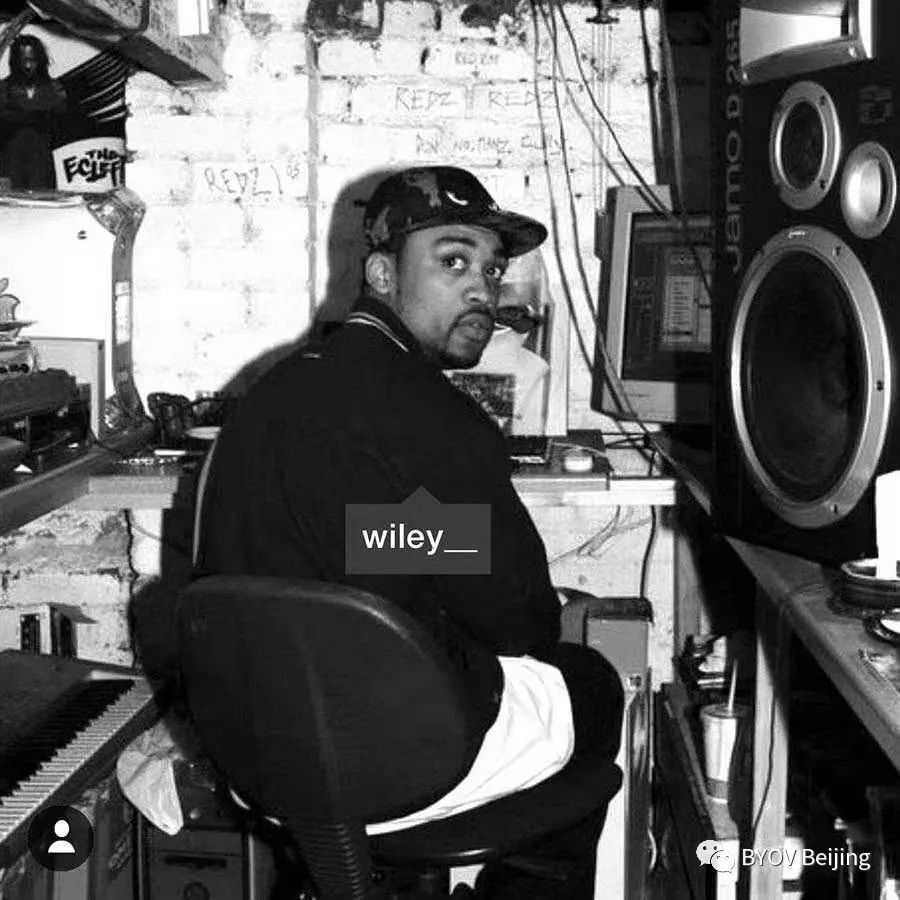
The godfather of grime, Wiley, who started out doing pirate radio
被称为grime音乐的教父,Wiley,最早在海盗电台上出名
PIRATE RADIO AND ALLEGATIONS OF CRIME
纵观海盗广播的整个历史,尤其是在Grime的出现之后,就像90年代早期的NWA等美国组织的黑帮说唱一样,不仅遭到当局的谴责,而且受到主流媒体的冷落。海盗电台不仅面临着贸易和工业部(DTI)的不断追捕,运行期间,电台DJ和他们所居住的住宅区也受到了攻击。媒体将海盗电台描绘成一种地下毒品流氓运动,指控他们所播放的音乐和文化导致了社会暴力循环。他们再次提起了盗版电台及其使用的频率对电波造成严重破坏的说法,对其他电台尤其是紧急服务造成了干扰。
Throughout pirate radio’s history, but particularly with the genesis of grime, which like the Gangster rap of early 90’s US groups like NWA, was vilified by the authorities and viewed frostily by the mainstream, the medium was harassed. On top of the Department of Trade and Industry’s (DTI) mission to eradicate pirates from the airwaves, the communities themselves were under attack. The media painted pirates as an underground drug/gangster movement, with a cycle of violence perpetrated by the music they promoted. They once again pushed forward the claim that pirate stations and the frequencies they used wreaked havoc on the airwaves, causing disturbances to other stations and in particular the emergency services.
1993年7月,Kool FM的姊妹台Rush FM受到当局的突袭,导致媒体同时指责两个电台举办的狂欢派对向参加的人贩卖毒品。这部简短的纪录片反映出KOOL FM的经历以及当年伦敦海盗电台的生存环境。
In July 1993, Rush FM, sister station to Kool FM, was subject to a high profile raid by the authorities leading to media accusations of drug dealing at raves promoted by the two stations. The experience of Kool FM and the general setting that pirate radio stations operated under is captured in this short documentary style piece.
Radio Today
一如往常的,主流广播继续模仿海盗广播的发展趋势,2002年,Radio 1建立了1xtra,同类似于Rinse FM电台进行直接竞争,1Xtra更加专注于新兴的城市音乐类型,如Grime,Trap和Drill。不过,许多来自海盗电台的DJ和MC都鄙视这样直接作为“舶来品”的合法电台,他们认为BBC Xtra为这些新兴音乐的崛起并没有做出任何付出,他们还觉得主流广播电台只是在借花献佛,对于都市地下音乐他们则认为这些主流电台无非就是想从听众们身上再薅一把羊毛而已。
Dugs叔叔描述了参与早期海盗电台运行时的经历:“你不得不成为电台的成员,大家都会一块儿上屋顶用脚手架撑起天线。在大半夜中,站在顶层边上被风吹得头昏眼花,楼下测试信号的人还通过电话跟你喊“往左一点,多一点点。好的别动!”,他还接着说:“很多社会边缘人在海盗电台收到了关怀,他们就认为‘这是我和我这帮哥们儿与世界对抗的一种方式’”
尽管杜格斯(Dugs)认为主流广播的状态可能并不理想,但看到Skepta,JME,Dizzee Rascal,Wiley等艺术家从海盗电台出来,后来还获得了超高知名度和认可,他就觉得他们电台是为了更伟大的事业而生的。
Mainstream radio continued to keep a track of the trends pirate radio set and in 2002 Radio 1 launched 1xtra in response to stations such as Rinse and made a much more dedicated commitment to emerging genres of urban music like grime, trap and drill. Many DJ’s and MC’s from the pirate scene were contemptuous of mainstream radio appropriating pirate sounds, seeing it as trying to cash in on the urban pound note without being involved in the scene’s evolution.
Uncle Dugs describes being involved in the early scene, “You became part of the station, so you started having to go with them on the roof, carrying scaff poles for the aerials. You’d be up there in the the night, with the wind blowing a force ten gale and someone in the phone going ‘Left a bit, right a bit. Stand still!’”, before adding, “If you weren’t accepted in other walks of life, pirate gave you the feeling of ‘It’s me and my mates against the world’”
While Dugs agrees that the mainstream might not be perfect, seeing artists like Skepta, JME, Dizzee Rascal, Wiley, and others come up through the pirate scene and gain superstardom makes him feel the station served a purpose for the greater good.
如今,新一代在线电台接手了海盗电台的使命,例如伦敦南部的Reprezent和Balami以及东部的Radar Radio就是其中典型的几个。 Radar的电台经理Ben Fairclough对海盗式在线电台的不断蓬勃发展做了简单的解释:“调到Kool,Rinse或Radar,您会听到不同的声音,”他说。 Radar的工作人员都是听海盗广播长大的,即使与早期海盗电台比性质大相径庭,但Radar还是试图通过自己的节目找回当年的海盗精神。开发经理加文·道格拉斯(Gavin Douglas)说:“我们的海盗式播放内容不属于违法,这给我们更多发展的机会。”“如果你是在线独立播放的电台,就不会受到任何约束或内容限制。”
殊不知,主流电台注意到的某个“新艺术家”却早已露面于在线电台。Stormzy和Novelist成为家喻户晓的音乐人之前就受到Reprezent电台的大力支持和曝光,在Radar电台,像MC Dizzee Rascal、DJ 兼制作人Ray Keith这样的老炮儿们也都受邀参加过节目。另外,这些电台也给年轻新秀们带来了很多展示的机会,其中很多新秀们甚至在海盗统治无线电波时都还没有出生,但他们却很积极地每天来电台支持和参与。 Radar的另一位经理哈里特·泰勒(Harriet Taylor)笑着说:“我们做得很好,但我们也是一个社区。”“这边的氛围很好。这里不放歌时,大家也会过来坐在沙发上喝茶谈笑风生。”
Today, the spirit of the old FM pirates has been embraced by a new generation of online stations, like Reprezent and Balamii in south London and Radar Radio in the east. Radar’s station manager Ben Fairclough gives a simple explanation as to why pirate-style radio continues to thrive: “Tune into Kool, or Rinse, or Radar and you’ll hear something different,” he says. Radar’s staff grew up listening to pirate radio and try to capture that energy in their own programming, even if the nature of the station is vastly different. “You can do pirate stuff without being illegal, which has opened the gates,” says senior development manager Gavin Douglas. “If you’re streaming independently online, you can do whatever you want.”
By the time mainstream radio starts hyping an artist, it’s likely these stations will already have had them on。Reprezent, for example, was crucial for spotlighting artists like Stormzy and Novelist, and at Radar, big names like Dizzee Rascal have come through while legends like Ray Keith continue to make magic. But the stations are also a hotbed of young talent – kids who weren’t even been born when pirate ruled the airwaves – often acting as a community hub as much as a radio station. “We’re doing good radio, but we’re a community too,” laughs Harriet Taylor, another of Radar’s managers. “It’s such a vibe. Even when people aren’t playing, you’ll find them on the sofa drinking tea.”
通过合法的在线广播,这些电台可以创造并宣传自己的品牌,做品牌周边,以品牌的名义参加音乐节和举办自己的活动(这些品牌在国内甚至国外被广泛认可)。虽然昔日的海盗电台无法获得这样的商业和品牌合作机会,但这并不意味着非法电台现在已然消亡。互联网改变了海盗广播的性质,但它还在继续存在,也还在被当局追捕。
By broadcasting legally online, stations can build identifiable brands that are recognisable on t-shirts, festivals, and club nights around the UK (and, increasingly, around the world). With this comes commercial and brand partnership opportunities that are inaccessible to pirates – but that doesn’t mean there aren’t still stations broadcasting illegally, if you know where to look. The internet has changed the landscape for pirate radio, but the scene lives on with setups still being impounded every year.
DO PIRATE STATIONS STILL EXIST
尽管海盗广播的性质在过去几年中不断发展和变化,但仍然有一些公司致力于将纯正海盗电台的心灵带给听众。海盗广播是亚文化,它不像过去其它亚文化运动有着一个聚集地点,例如60年代国王路(King’s Road)的朋克(Punks)和卡纳比街(Carnaby Street)。海盗电台的参加者只要在广播传输范围之内,就可以进行交流和社交。在线电台广播几乎不受政府限制,并且建立在线电台的操作简便,开创成本费用也很低,因此很多人认为非法海盗电台将来很可能被在线电台它所代替。并且在电波中逐渐消失。
While the nature of pirate radio has evolved and changed over the years, there are still companies out there that are dedicated to bringing the heart and soul of the pirates to their listeners. Pirate radio was a subculture without a centralised stage such as the Punks’ on King’s Road and Carnaby Street of the 60’s, it was as accessible to communicate and socialise as far as the transmissions supported.
With internet radio nowadays being able to exist almost free from censorship and taking into account the relative ease and low costs associated with setting up an internet station, it could be seen that pirate radio has ceased to serve a purpose and might slowly disappear from the airwaves.
Imaginary Forces是一位实验性制作人和DJ,他在90年代的各个海盗电台上放Drum & Bass,他很清楚新一代在线电台与非法海盗电台之间的区别,其中之一就是与观众的互动,虽然他说自己很喜欢听预录的节目,但是他也觉得在线电台使用的预先录制的节目意味着经常缺少关键因素。他说:“Radar和NTS很酷,但这些电台无法捕捉到海盗电台的热闹气氛。”“在盗版中,人们必须收听。您可以打电话让DJ像你朋友传个话,我喜欢那种感觉。”
他还认为在线电台播放的音乐类型太多,而不是集中于一种风格,尽管他认为这不一定是负面的。“这样也好,因为现在听在线电台都是充满了热衷于新事物的年轻人。”但是,海盗电台通常是特定类型的,因此DJ可以展示任何一种风格的各种排列。“海盗可以更加专注于固定的范围。他们可以向您展示该音乐的全部谱系。”
Imaginary Forces, an experimental producer and DJ who cut his teeth DJing drum’n’bass on the pirate scene in the 1990s, is clear about the differences between new generation internet stations and pirate radio. One of them is audience interaction: while quick to say that playback is something he’s into, he feels that the pre-recorded shows used by internet stations means that a crucial element is often missing. “Radar and NTS are cool, but these stations can’t ever capture the pirate vibe,” he says. “On pirate, people have to tune in to listen. You can do shout-outs. I love that.”
He also sees a lack of identity in stations that play a spread of music, rather than honing in on one genre – though he’s doesn’t necessarily see this as a negative. “It’s great, because now the youngers are going to the internet stations. They’re full of young people keen for new stuff.” However pirates are generally genre-specific, allowing their DJs to showcase various permutations of any one style. “Pirates can have a stronger, deeper focus on particular niche areas. They can show you the full spectrum of that music.”
从根本上讲,海盗电台的非法性质是他独一无二的卖点。即使在今天这样对非法广播电台的攻击没有以前那么猛烈的时代,这样的广播也仍然存在风险。Imaginary Forces说:“听这些电台缺少一种刺激感,缺少那种粗糙且随时可用的DIY感觉。”“如果我上海盗电台放歌,那我就藏起我的唱片袋,这是很隐秘的。”在线电台和合法电台没法再现那种感觉,他们做事情很正式,不破坏行业常规。“(大多数)海盗电台不想成为下一个Rinse FM,他们想留下海盗电台的叛逆精神。他们的运营者都是有自己想法的人,他们很特别。”今天,Imaginary Forces继续在合法广播和海盗广播两方交涉。他咧嘴笑着说:“我不会说出我经常参加的海盗电台的名字。”对于已经习惯完全依靠网上来寻找活动信息的这代年轻人,恐怕他们搜索不到,Google浏览器给不了有关海盗电台的信息。他补充说:“很显然他们都不做做广告,只能通过口耳相传,或者自己调整一下不同广播频率,你会找到它们的,仔细看看还能看到它们的装备和天线,他们仍然在那里,有的甚至在过去十年中一直在播放,广播不会停止,这是周期性的。如果你封闭人们的嘴,他们会找到另外一种表达方式,在线电台的出现是个很
棒的事情,但并非一切。”
Fundamentally, the illicit nature of pirate is key. Even though illegal broadcasters aren’t targeted so relentlessly today, there’s still a risk in broadcasting. “There’s an edge missing, that rough-and-ready, DIY feeling,” says Imaginary Forces. “If I go up pirate, I’m hiding my bag of records. It’s still very covert.” It’s a world away from the increasing professionalism of online stations and former pirates alike. “(Most) pirates don’t have aspirations to become the next Rinse. They want to stay pirate. The managers are very singular individuals; they’re a breed apart.” Imaginary Forces continues to float between legal and pirate radio today. “I’m not gonna say any names of pirates still broadcasting,” he grins. For a generation dependent on the internet, finding pirate stations on Google won’t bear much fruit. “Obviously none of them advertise,” he adds. “The only way is word-of-mouth, or do a radio scan. You’ll find them. You can still spot rigs and aerials. They’re still there – even the ones that have been denying it for the past ten years. Pirate will never stop; it’s cyclical. If you push people hard enough, they’ll find a mode of expression. The internet has been pretty cool for that, but it’s not the be-all-and-end-all.”
尽管存在繁琐的工作,成本和法律风险,但盗版电台仍然沉迷于当今数十年来的电波广播。Imaginary Forces说:“毫无疑问,有年轻人一直在玩,新的电台无处不在,更新迭代的速度甚至可以以天计算,但是它们永远都在,海盗电台也从来没有离开过- 人们只是把它们给忘掉”。
Despite the legwork, the costs, and the legal risks, pirate radio stations are just as obsessed with broadcasting on the airwaves today as they have been for decades. Imaginary Forces says, “There’s no doubt in my mind that there are young people out there doing stuff. New stations come and go all the time, literally overnight. There always is and there always has been pirate radio. It never went away – people just lost track of it.”
总结
第一波海上海盗广播电台的开拓精神和创业精神打破了英国广播公司在广播电台中的束缚。它们改变了人们通过广播可以收听的音乐和内容,也改变了广播业之后的管理和处理方式。
直至80年代,第二波基于城市的海盗广播电台替社会上代表性不足的群体的音乐和文化发出了声音,最终将这些声音的意识和曝光度推向了公众的视线。在第二波的后期,即90年代和2000年后期间,海盗广播电台为英国以都市新兴音乐和文化为主的形式走向大社会关注提供了跳板,甚至可以说它塑造了现代都市化文化。
近年来,随着人们听音乐和广播的方式发生变化,尽管海盗电台的作用比过去少了些许开拓性和影响力,但是,它们仍然提供了原始且个性化的媒体,可供内城区的年轻人调入。因此,可以肯定的是,如果没有盗版广播的贡献,英国的音乐景观将不会是今天的样子,海盗电台所做出的创新和实行的运营模式影响至今,并且为将来音乐领域打上了不可磨灭的印记。
Summary
The pioneering and entrepreneurial spirit of the first wave of off shore pirate radio stations broke the stranglehold that the BBC had on the airwaves. It changed the music and content that was available for people to listen to, it also changed the way that broadcasting was managed and approached.
Later, starting from the 80’s, the second wave of urban-based pirate radio stations gave a voice to the music and culture of underrepresented groups in society, eventually pushing awareness and exposure of these sounds into the public eye.
Later on in the second wave, during the 90’s and early 2000’s pirate radio stations provided a springboard for newer, predominantly urban UK, forms of music and culture, literally shaping the sound and culture of the new urban youth.
In more recent years, with changes in the way that people listen to music and radio, the role of pirate’s is less pioneering and influential than in the past. However they still provide a raw and personalized medium for which inner city youth can tune into
One thing is for sure, the musical landscape of the UK would not be what it is today without the contribution of pirate radio, the innovations and approaches that it made are ever present today and will still be felt in the future.
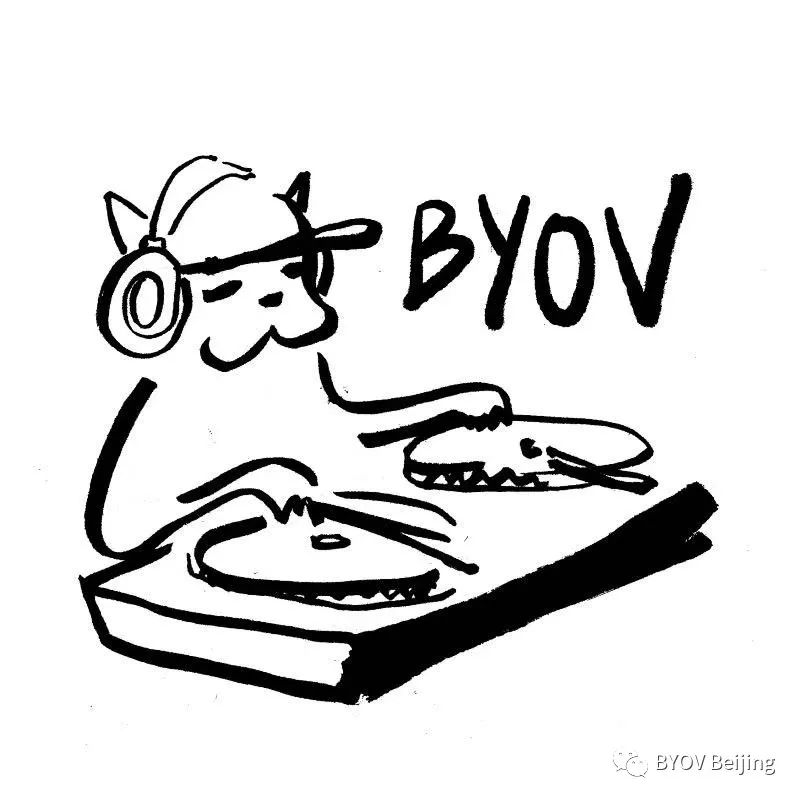
The BYOV Beijing official account is dedicated to writing music related articles, we are a small group of indiviuals who have a shared passion for music and music history. If you are interested in getting involved and contributing towards music related articles or getting involved with our platform feel free to contact us.
BYOV Beijing公众号是致力于写有关音乐和音乐历史的内容,我们是一个小组和,所有的人都有一个共同爱好,那就是音乐。如果你想加入到我们的BYOV群体或和我们一起共同作出音乐主题的稿子可以直接和我们联系。